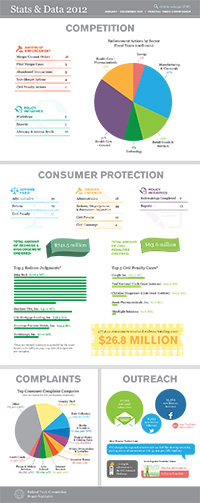In testimony today before a U.S. Senate Judiciary subcommittee the Federal Trade Commission detailed its work on behalf of consumers in protecting competition in three key sectors of the economy – health care, technology, and energy.
Testifying on behalf of the FTC before the Subcommittee on Antitrust, Competition Policy, and Consumer Rights, Chairwoman Edith Ramirez said that competitive markets are the foundation of the U.S. economy and that effective antitrust enforcement is essential for those markets to function well. “Vigorous competition promotes economic growth and overall consumer welfare by keeping prices competitive, expanding output and the variety of choices available, and promoting innovation,” she said.
The rising cost of health care is a serious concern for most Americans, the testimony states, and accordingly, it is critical that the FTC act to preserve and promote competition in health care markets. This includes stopping anticompetitive health care mergers and combatting efforts to stifle competition for lower-cost generic pharmaceuticals through anticompetitive “pay-for-delay” agreements, the testimony states.
The testimony notes that recently the U.S. Supreme Court unanimously ruled in favor of the Commission, reviving its challenge to a hospital merger in Albany, Georgia, that resulted in an alleged monopoly for inpatient services. The case will now be heard in an administrative trial scheduled to begin this summer. In a second agency case before the Supreme Court, FTC v. Actavis, Inc., the FTC is appealing a circuit court ruling on pay-for-delay patent settlements related to the testosterone replacement drug AndroGel. “We are hopeful for a favorable decision from the Supreme Court that stops these anticompetitive settlements,” the testimony states.
Discussing the Commission’s antitrust oversight of the nation’s technology markets, the testimony highlights the agency’s balanced and fact-based approach. Sometimes, this leads the Commission to conclude that a proposed merger is likely to harm competition; at other times, the evidence supports a more cautious approach.
Working to preserve competition in the nation’s energy markets, the FTC uses all of the tools at its disposal, including monitoring industry activities, investigating possible antitrust violations, prosecuting cases, and conducting studies.
The testimony concludes with an overview of the FTC’s cooperation with other antitrust enforcers, including the Department of Justice’s Antitrust Division and counterparts worldwide, to ensure that competition laws function coherently and effectively.
The Commission vote approving the testimony and its inclusion in the formal record was 4-0.
The FTC’s Bureau of Competition works with the Bureau of Economics to investigate alleged anticompetitive business practices and, when appropriate, recommends that the Commission take law enforcement action. To inform the Bureau about particular business practices, call 202-326-3300, send an e-mail to antitrust{at}ftc{dot}gov, or write to the Office of Policy and Coordination, Bureau of Competition, Federal Trade Commission, 601 New Jersey Ave., Room 7117, Washington, DC 20001. To learn more about the Bureau of Competition, read Competition Counts. Like the FTC on Facebook, follow us on Twitter, and subscribe to press releases for the latest FTC news and resources.
(FTC File No. P859910)

